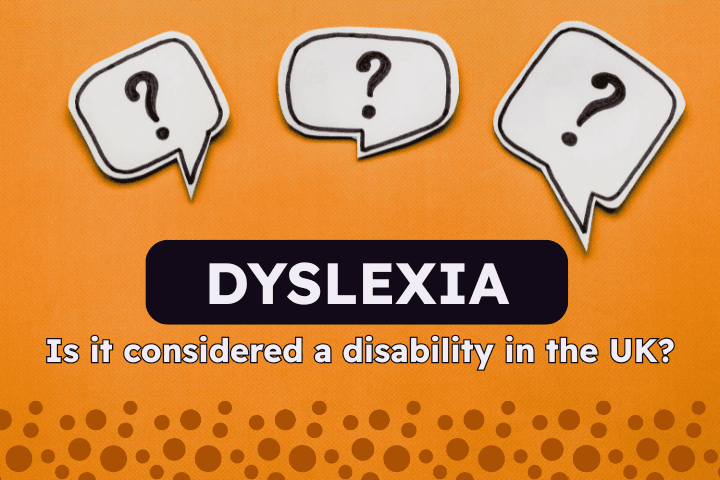All Articles
3 min read
Is Dyslexia Considered a Disability in the UK?
Written by
Purpl
Published on
June 5, 2025

Yes, Dyslexia is legally recognised as a disability in the UK under the Equality Act 2010. That means people with dyslexia are entitled to support and reasonable adjustments at school, work, and beyond.
But dyslexia is also hugely misunderstood. Many still think it just means “mixing up your letters”, when in reality, it affects how the brain processes all kinds of information: reading, writing, memory, time, even self-esteem.
So let’s break it down.
What is Dyslexia?
Dyslexia is a neurodevelopmental difference that primarily affects skills involved in accurate and fluent reading and spelling. But that’s just the start.
Dyslexia can also affect:
- Short-term memory
- Processing speed
- Time management
- Organisation
- Sequencing
- Concentration
- Verbal fluency
- Confidence
It’s not a reflection of intelligence – many people with dyslexia are highly creative, strategic, and intuitive thinkers. The challenge isn’t with learning, it’s with how the brain learns and processes information.
Common Symptoms of Dyslexia
Dyslexia presents differently in every person, but some classic signs include:
- Difficulty reading fluently or spelling accurately
- Slow reading or writing speed
- Avoiding reading aloud or public speaking
- Struggling to remember instructions, sequences, or dates
- Poor working memory
- Mixing up left and right, or confusing similar-looking words/sounds
- Trouble with organisation and timekeeping
- Feeling mentally exhausted after reading or writing tasks
How Common is Dyslexia in the UK?
- It’s estimated that 10–15% of the UK population has dyslexia
- That’s over 6 million people
- Many go undiagnosed or are diagnosed late, especially if they mask well or find “coping strategies” that hide the struggle
How is Dyslexia Diagnosed?
There’s no blood test or brain scan for dyslexia – it’s diagnosed through a specialist assessment, usually done by an educational psychologist or a trained dyslexia assessor.
Assessment includes:
- Literacy and cognitive tests
- Reading and writing tasks
- Memory and processing exercises
- Interviews and background history
You can be assessed:
- Privately (typically £400–£800)
- Via your school, college, or university
- Sometimes via your employer under the Equality Act
- Rarely via the NHS, unless linked with another referral
Dyslexia in Education
Dyslexia affects learning from early on, but support in schools is still patchy.
What’s available:
- SEN (Special Educational Needs) support
- 1:1 teaching or small group interventions
- Use of coloured overlays, laptops, or software
- Extra time in exams
- EHCPs (Education, Health and Care Plans) for more complex needs
- Disabled Students’ Allowance (DSA) in higher education for software, tools, or mentoring
But many students are still labelled as “lazy” or “disruptive” instead of being recognised as neurodivergent.
Dyslexia in the Workplace
Adults with dyslexia may face:
- Trouble processing emails or long written documents
- Forgetting deadlines
- Struggling with admin-heavy tasks
- Low confidence in meetings or communication
- Fatigue from masking or overcompensating
The good news? If your dyslexia has a substantial, long-term effect on your daily work, it’s a legal disability. That means you can ask for:
- Reasonable adjustments like assistive tech, screen readers, templates, spellcheckers, or flexible working
- Access to Work funding for coaching or software
- Support with disclosure or assessments
How it Impacts Daily Life
Outside of work and school, dyslexia can still affect everyday tasks:
- Following written instructions
- Reading forms or medical letters
- Budgeting or managing finances
- Organising appointments or transport
- Feeling “stupid” or ashamed in public-facing situations
That internalised shame is one of the hardest parts, and it’s completely undeserved.
Emotional & Social Impact
Living with undiagnosed or unsupported dyslexia can lead to:
- Anxiety, especially in reading-heavy environments
- Low self-esteem or “imposter syndrome”
- Avoidance of jobs, studies, or hobbies that require reading
- Feelings of failure, even when working twice as hard
- Social isolation due to embarrassment or misunderstanding
What Can You Claim?
If dyslexia affects your daily life, you might be eligible for:
- PIP (Personal Independence Payment) – depending on severity and daily impact
- Access to Work – to fund coaching, software, or admin support
- DSA (Disabled Students’ Allowance) – for university-level support
- EHCPs – for school-age children
- Council Tax discounts or local schemes – in some cases
You do not have to “prove” you’re struggling. If it affects your life significantly, you’re entitled to support.
Where to Get Support
Helpful UK resources:
- British Dyslexia Association – bdadyslexia.org.uk
- Helen Arkell Dyslexia Charity
- Made By Dyslexia (great for employers and parents)
- Your school, uni, or workplace SEN support team
- Access to Work (via gov.uk)
Final Thought
Dyslexia is a disability in the UK – not because people with dyslexia aren’t capable, but because our systems still aren’t built to support them.
Recognising it legally means we can remove barriers, unlock talent, and make sure dyslexic people aren’t constantly forced to work twice as hard for half the credit.

Sammi is autistic, has ADHD, and lives with POTS. She’s passionate about disability advocacy, accessibility, and creating spaces where people feel seen, heard, and understood. With a sharp sense of humour and a deep love for community, she speaks openly about the realities of being neurodivergent across all of her personal platforms, always aiming to challenge stigma, spark conversations, and remind others they’re not alone.
Other articles you might like:
Is Autism Considered a Disability in the UK?
Is ADHD Considered a Disability in the UK?
